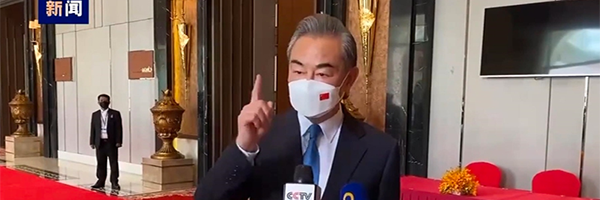Pelosi’s ‘reckless’ Taiwan visit keeps SE Asian countries on tenterhooks
 Zhao Yusha August 3, 2022 — US House of Representatives Speaker Nancy Pelosi’s “reckless” visit to Taiwan island on Tuesday not only raised tensions across the Taiwan Straits, but also keeps Southeast Asian countries on tenterhooks as several regional countries expressed concerns right after her arrival.
Zhao Yusha August 3, 2022 — US House of Representatives Speaker Nancy Pelosi’s “reckless” visit to Taiwan island on Tuesday not only raised tensions across the Taiwan Straits, but also keeps Southeast Asian countries on tenterhooks as several regional countries expressed concerns right after her arrival.
Experts believe Pelosi’s “trip of trouble and provocation” will keep relevant countries more alert to foreign interference, and open their eyes wider to see who the biggest saboteur of regional stability is.
Southeast Asian foreign ministers will seek ways to help calm rising tensions over Taiwan at regional talks on Wednesday, after Pelosi arrived on the island, AFP reported. It said that the Deputy Secretary-General of ASEAN Kung Phoak, Secretary of State of Cambodia’s foreign ministry, said the meeting would seek to calm the waters.
He told reporters that ministers would try to find ways the bloc could help “so that the situation in Taiwan will be stable, that it won’t lead to a conflict and won’t escalate the political heat among all concerned parties.”
Talking to reporters at the ASEAN Foreign Ministers’ Meeting in Cambodia on Wednesday, Chinese State Councilor and Foreign Minister Wang Yi said that Pelosi’s visit was a complete “farce” and those who play with fire won’t end well, and who offend China will be punished.
The US is conspiring to violate China’s sovereignty under the banner of “democracy,” and Taiwan regional leader Tsai Ing-wen is colluding with the US, walking back on national interests, said Wang, noting that all those actions that try to turn the clock back won’t change the international consensus of the one-China principle, and won’t change the trend that Taiwan will eventually return to the embrace of the motherland.
The Lao government firmly supports the one-China principle and China’s cause of national reunification, and it opposes any attempt to create “two Chinas” or “one China, one Taiwan.” Laos is concerned that relevant provocative acts may trigger regional tensions, said the Lao Foreign Ministry on Wednesday.
“Vietnam wishes for all relevant parties to restrain themselves, not escalate tensions in the Taiwan Straits, positively contribute to the maintenance of peace and stability, and strengthen cooperation and development in the region and the world,” Vietnamese Ministry of Foreign Affairs spokeswoman Le Thi Thu Hang said on Wednesday.
“It is important for the US and China to ensure continuing communication to avoid any miscalculation and further escalation of tensions,” Ambassador Ma. Teresita Daza, spokesperson of the Philippines’ Department of Foreign Affairs, said in a WhatsApp message to the media on Tuesday, the Philippine Star reported.
Pelosi’s visit has pushed ASEAN countries into a precarious situation where they sense rising foreign interference and threats to regional stability. This is something that those countries are striving to avoid, and it challenges their long-cherished peace and development, Tang Qifang, an associate research fellow at the China Institute of International Studies, told the Global Times.
Tang expected ASEAN countries to stress their unified stance during the ASEAN meetings and push for regional stability. Worsening China-US ties pose a grave threat to smaller countries.
Chen Xiangmiao, an assistant research fellow at the National Institute for South China Sea Studies, said that there is no doubt that sticking to the one-China principle and avoiding the China-US escalating conflict represent a consensus within the ASEAN bloc.
“The reason why not every country from the bloc speaks out is because some are afraid of aggravating the US. After all, the US government has been depicting Pelosi’s visit as her personal choice,” said Chen, noting that Pelosi’s visit and the trouble that has come after it has made those countries clearer to the fact of who is the biggest saboteur of regional stability.
After shouldering the blow of COVID-19 and the Ukraine crisis, regional countries crave stability more than anything else, and any country that tries to stir conflict in this region will be persona non grata, according to Chen.
This week’s events are the first in-person meetings of foreign ministers from ASEAN countries after a two-year hiatus due to the COVID-19 pandemic, the Straits Times reported. It said that ASEAN foreign ministers will also meet their counterparts from 11 key dialogue partners this week – Australia, Canada, China, the EU, India, Japan, New Zealand, South Korea, Russia, the UK and the US.
Chinese Foreign Ministry spokesperson Hua Chunying announced that Wang Yi has no plans to meet with US Secretary of State Antony Blinken although both are attending the 55th ASEAN Foreign Ministers’ Meeting and related meetings in Cambodia, a decision seen by experts as a signal that reflects the severity of the visit, as well as China’s outrage toward the US provocations.
Because of ASEAN countries’ reluctance to see an escalating conflict between Beijing and Washington, Chen said that those countries could serve as “mediators” to assuage the tension, as this bloc always upholds a goal of “not taking sides” and a neutral stance, which gives it a legitimate posture to persuade Washington from adding fuel to the fire.
Also this bloc can provide multiple platforms for big powers to negotiate, said Chen, citing the holding of the G20 meeting in Indonesia in the latter half of this year, and the APEC meeting in Thailand.
